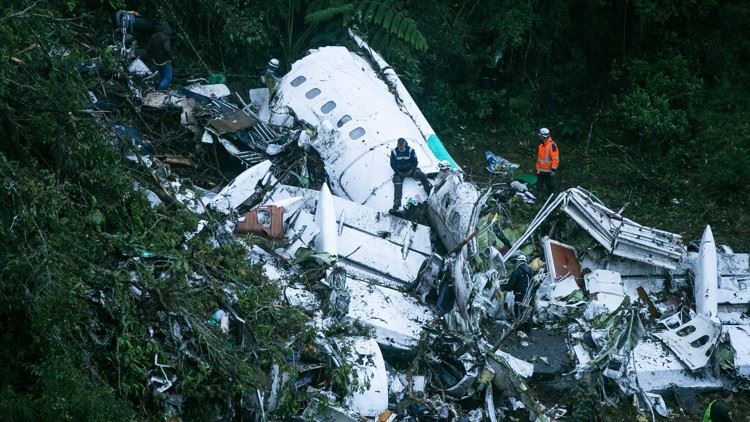On June 7, 107IST brings you a preview screening of “Nossa Chape” at Cinema 21, with proceeds going to benefit Gisele Currier Scholarship Fund. Tickets here.
The film had its world premiere in March at the South by Southwest Film Festival and is making its way across the country this spring.
To whet your appetite, Timbers Army OG Shawn Levy, who was film critic of The Oregonian for 20 years, had a look at it and offers this review.
“Nossa Chape” is a documentary, but you can be forgiven for thinking of it as a horror movie.
It takes as its starting point a tragedy that no one can fully imagine, even if, at some level, it seems like one that ought to have occurred more often than it has.
On November 28, 2016, a chartered plane ran out of fuel and plummeted into a mountainside in Northeast Colombia, killing 71 of those on board, including 19 players from the Brazilian soccer team Chapecoense, 25 team officials and guests, and 20 journalists who were along to cover the team's appearance in the Copa Sudamerica final.

This wasn't the first time the footballing world has suffered such a calamity. Indeed, as even a partial list of the times that it has happened demonstrates, this brand of catastrophe is an indiscriminate beast.
Torino of Italy (1949), Manchester United of England (1958), Green Cross of Chile (1961), The Strongest of Bolivia (1969), Pakhator Tashkent of Uzbekistan (1979), Alianza Lima of Peru (1987), and the men's national team of Zambia (1993) -- all wiped out, or deeply ravaged, by air crashes, all leaving families, communities, and even nations devastated, all creating holes in the world that survivors and supporters were forced to fill with the seeds of rebirth.
It's impossible to comprehend how any community could function after this sort of nightmare at any time, but, as this film makes clear, the Chapecoense story was especially cruel.
As a team, Nossa Chape (“Our Chape”) was one of the feel-good stories of Brazilian soccer -- in all of South American soccer, in fact. Representing Chapeco, a city of a mere 200,000 souls in Brazil's southwest, the team rose from the obscurity of the fourth division to reach Brazil's highest tier in 2014. Just two years later, Chape qualified for second-most prestigious club tournament in South America and made a heroic run, defeating several larger, better-known teams to advance to the championship round against Atletico Nacional of Colombia. They were en route to the first match of that final when they crashed.
.jpg)
For its fans, Chape was more than just a group of sporting heroes.
Composed of the city's sons, brothers, and friends, it was a team of ambassadors bearing the name and the heart of the town into the world. And on that awful night, that heart was crushed. Chape was awarded the Copa Sudamerica when Atletico refused to accept it, but there was barely anything left of the club. Only three players had survived the crash, plus the handful who hadn't made the trip, and almost none of the front office. How do you rebuild from the ashes when ashes are just about all that you have?
“Nossa Chape” is the story of that process: the tragedy itself, the painful aftermath, the communal effort to keep the team alive, the harrowing path back to normalcy on the part of the survivors, and the aching cavity in the hearts of the wives, mothers, friends, and fans left behind.
.jpg)
Directed by Jeff and Michael Zimbalist and Julian Duque, all of whom have impressive sports movies on their resumes, it is an intimate, deeply moving portrait of people trying to move forward after being knocked unimaginably backward.
Along with footage of the disaster – the joking around before the flight, the recovery efforts by first responders, the shock wave as the news spread throughout Chapeco, the heart-wrenching memorial services – the filmmakers bring us close into the rebuilding and recovery efforts.
We meet devastated widows and grieving parents, and we become especially familiar with the three players who survived the crash: Jackson Follmann, Alan Ruschel, and Neto, the latter two of whom actually strive to play again after their miraculous escapes. Time and again, you are brought to tears; even in this era of great documentaries, this is one of the most heartbreaking ones you'll ever see.
.jpg)
The bulk of the film focuses on the team's return to the pitch mere months after the disaster: a new coach, staff, and squad trying to carry on as a competitive enterprise even as they're all still reeling.
The surviving players don't know how they fit in; the front office doesn't know what to prioritize or how to implement it; and the fans, amazingly, wait barely four or five matches before voicing their displeasure with the results (the results!) achieved by what was essentially a pick-up team playing under an inconceivable cloud of pressure, scrutiny, uncertainty, and grief.
In a sense, this is the most universal aspect of the film. Just as we can all relate to the emotional bond between team and town, we can all recognize a fan base that hungers, even angrily, to see its collective ambition mirrored on the playing field. And while we might expect the former to be strengthened by a disaster, it's amazing to see that the latter persists as well. The next time you hear someone bellyache about your favorite team's tactics or substitution patterns or “caring,” remember that there are people who can get upset that their team isn't winning matches three months after it was wiped out in a plane wreck. If nothing else, “Nossa Chape” shows us that focusing on wins and losses, even in this context, is an inherent aspect of the human impulse to see oneself reflected in a team.
That, ultimately, is what the film is about: the emotional connection that makes soccer so vital to so many people who earn a living at it or make a business of it or devote themselves to it as fans. The culture around a team has far more to do with shared humanity than with scores and trophies. That bond is the essence of community, and this film captures it with great, vivid immediacy and at a heightened level that the rest of us, tap wood, will never experience in real life.
-Shawn Levy


